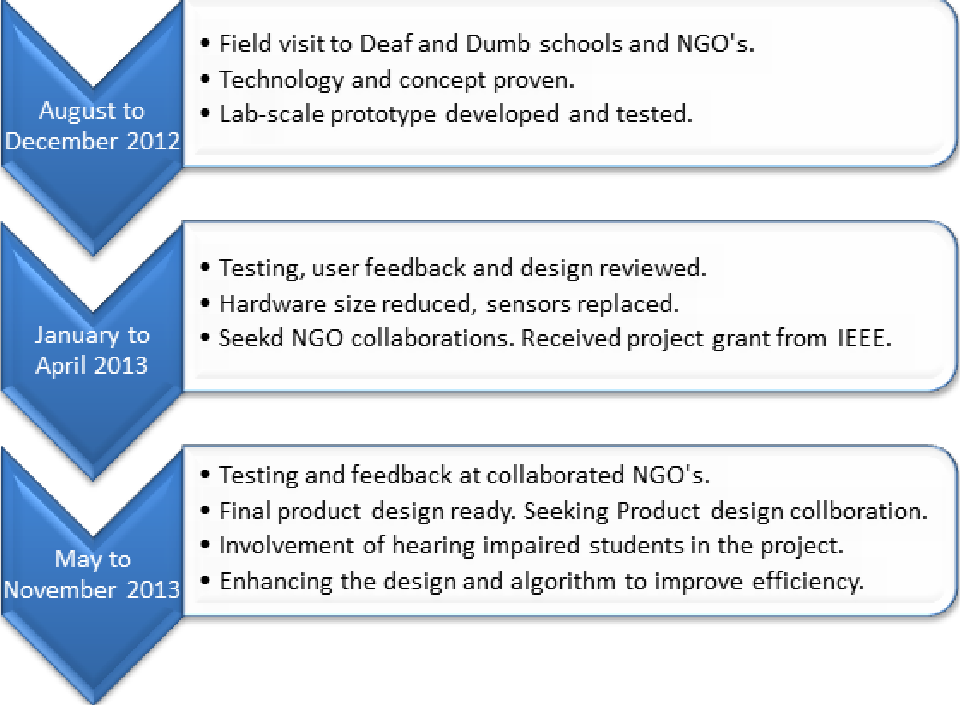TalkAble: A Talking Hand Glove for Hearing Impaired
By Kuldeep Singh V Rajput
TalkAble is a low-cost assistive technology for people suffering from hearing disability. Hearing impaired people generally use hand sign language to communicate. The main idea of TalkAble is to translate this sign language into speech. This affordable device gives them access to diverse media and opens doors for development of various products that shall empower them in the field of education, employment and quality of life. TalkAble has been developed to be equally applicable and available to users in both developed and developing countries.
Overview:
The right to speak should not be denied to anyone. It is injustice if we ignore those who are deprived of this invaluable gift. The only means of communication available to vocally disabled individuals is through sign language. Using sign language limits them to their own world of people. This limitation prevents them from interacting with the outer world to share their feelings, creative ideas and the potentials they possess; but very few people understand them. This increases the isolation of deaf and dumb people.
According to the World Federation of the Deaf (WFD), approximately 66 percent of Deaf people live in developing countries, where authorities are rarely familiar with their needs and where very few Deaf children have access to employment and education. Only about 10 percent of the world’s Deaf population receives any education at all, and only one percent receives this education in sign language – even though the majority of Deaf people worldwide use sign language in their daily lives. Reflecting this educational disadvantage, unemployment rates are extremely high in the Deaf community. Many nations even deny basic civil rights to their hearing impaired community.
Technology is one way to remove this hindrance and benefit these people. Assistive technologies assist humans in complex task such as recognize sign language and translate it into another form, such as synthesized speech or written form.
Development and Prototype:
TalkAble is an assistive device, whose main idea is to translate sign language into speech. The device (as shown in Figure 1) is in the form of a portable hand glove on which the display along with controller board is installed. The right handed glove is made of fabric, with five sensor boards mounted on the back nail sections of each finger. A controller is programmed to convert the sign language into alphanumeric characters and to display it on a LCD. Further, the obtained text is converted into voice and is given out as the output.

Figure 1
The development cycle followed for the TalkAble project is illustrated in Figure 2. For more information, please see the associated technical paper, and visit our web site http://catbvbcet.wix.com/talkable#!projects/c21kz

Figure 2
Recognition and Collaborations:
The project was supported by the IEEE Engineering Projects In Community Service (EPICS).
I would like to acknowledge my mentor, Dr Uma Mudenagudi, Head Of Department of Electronics and Communication, BVBCET Hubli, India. and head of the Research and Development Center of the institute; Shashank Deshpande, Bachelor in Electronics and Communication from BVBCET, Hubli. India; and the Center for Assistive Technology, BVBCET, Hubli for Collaboration and support.
Contributor
 Kuldeep Singh V Rajput is a Project Associate at the Indian Institute of Technology, Madras, India. He received the B. Tech degree from the B.V. Bhoomaraddi College of Engineering and Technology. His research interests are in the field of VLSI, Computer Vision and Graphics, Haptics, Signal Processing, Biomedical Engineering and Biosensors. Read more
Kuldeep Singh V Rajput is a Project Associate at the Indian Institute of Technology, Madras, India. He received the B. Tech degree from the B.V. Bhoomaraddi College of Engineering and Technology. His research interests are in the field of VLSI, Computer Vision and Graphics, Haptics, Signal Processing, Biomedical Engineering and Biosensors. Read more







 Mary Capelli-Schellpfeffer, MD, MPA, is Medical Director of Loyola University Health System's Occupational Health Services, and Associate Professor, Department of Medicine, Loyola University Chicago Stritch School of Medicine. Dr. Mary Capelli-Schellpfeffer guides Loyola's occupational medicine programs. An IEEE Fellow and global consultant regarding electrical safety, she is widely recognized for her work on risk mitigation in complex systems.
Mary Capelli-Schellpfeffer, MD, MPA, is Medical Director of Loyola University Health System's Occupational Health Services, and Associate Professor, Department of Medicine, Loyola University Chicago Stritch School of Medicine. Dr. Mary Capelli-Schellpfeffer guides Loyola's occupational medicine programs. An IEEE Fellow and global consultant regarding electrical safety, she is widely recognized for her work on risk mitigation in complex systems.  Emily Sopensky co-founded the RFID in Healthcare Consortium in 2008 as an educational not-for-profit addressing technology primarily in healthcare facilities. Initially created 5 years ago by the RHCC, 2014 is the first year the Symposium has substantial IEEE involvement (Life Sciences and Engineering Medicine and Biology Society). As an active IEEE volunteer and Chair-Elect, IEEE Technical Committee on RFID (CRFID), she anticipates next year's symposium will similarly have active IEEE participation.
Emily Sopensky co-founded the RFID in Healthcare Consortium in 2008 as an educational not-for-profit addressing technology primarily in healthcare facilities. Initially created 5 years ago by the RHCC, 2014 is the first year the Symposium has substantial IEEE involvement (Life Sciences and Engineering Medicine and Biology Society). As an active IEEE volunteer and Chair-Elect, IEEE Technical Committee on RFID (CRFID), she anticipates next year's symposium will similarly have active IEEE participation.  Kuldeep Singh V Rajput is a Project Associate at the Indian Institute of Technology, Madras, India. He received the B. Tech degree from the B.V. Bhoomaraddi College of Engineering and Technology. His research interests are in the field of VLSI, Computer Vision and Graphics, Haptics, Signal Processing, Biomedical Engineering and Biosensors.
Kuldeep Singh V Rajput is a Project Associate at the Indian Institute of Technology, Madras, India. He received the B. Tech degree from the B.V. Bhoomaraddi College of Engineering and Technology. His research interests are in the field of VLSI, Computer Vision and Graphics, Haptics, Signal Processing, Biomedical Engineering and Biosensors.  Po-Yen Wu is a Ph.D. student in the School of Electrical and Computer Engineering at the Georgia Institute of Technology. His research interests include (1) designing novel methodologies to improve the data analysis pipeline for RNA-sequencing data, (2) exploring data-mining techniques for extracting meaningful patterns in electronic health records, and (3) integrating information from RNA-sequencing data and electronic health records to improve the prediction performance of clinical endpoints.
Po-Yen Wu is a Ph.D. student in the School of Electrical and Computer Engineering at the Georgia Institute of Technology. His research interests include (1) designing novel methodologies to improve the data analysis pipeline for RNA-sequencing data, (2) exploring data-mining techniques for extracting meaningful patterns in electronic health records, and (3) integrating information from RNA-sequencing data and electronic health records to improve the prediction performance of clinical endpoints.  Janani Venugopalan is a Ph.D. student in the Joint Dept. of Biomedical Engineering at Georgia Institute of Technology and Emory University, Atlanta, Georgia. Her research focuses on health informatics. Her research focuses on clinical decision making using HER data, which are currently in collaboration with Children's Healthcare of Atlanta and Emory.
Janani Venugopalan is a Ph.D. student in the Joint Dept. of Biomedical Engineering at Georgia Institute of Technology and Emory University, Atlanta, Georgia. Her research focuses on health informatics. Her research focuses on clinical decision making using HER data, which are currently in collaboration with Children's Healthcare of Atlanta and Emory.  Sonal Kothari received her Ph.D. degree in the School of Electrical and Computer Engineering at the Georgia Institute of Technology, Atlanta. She is currently a postdoctoral fellow working under Principle Investigator May D. Wang in the Department of Biomedical Engineering at Georgia Tech and Emory University. Her research interests are in the areas of imaging informatics, histopathological image analysis, pattern recognition, and visualization.
Sonal Kothari received her Ph.D. degree in the School of Electrical and Computer Engineering at the Georgia Institute of Technology, Atlanta. She is currently a postdoctoral fellow working under Principle Investigator May D. Wang in the Department of Biomedical Engineering at Georgia Tech and Emory University. Her research interests are in the areas of imaging informatics, histopathological image analysis, pattern recognition, and visualization.  Chanchala D. Kaddi is currently a Ph.D. student in Bioengineering at Georgia Institute of Technology. She is a National Science Foundation Graduate Research Fellow. Her research interests are in computational systems biology and bioinformatics, including methods for mass spectrometry imaging data analysis and predictive models for cancer research.
Chanchala D. Kaddi is currently a Ph.D. student in Bioengineering at Georgia Institute of Technology. She is a National Science Foundation Graduate Research Fellow. Her research interests are in computational systems biology and bioinformatics, including methods for mass spectrometry imaging data analysis and predictive models for cancer research.  Chih-Wen Cheng is currently pursuing his Ph.D. as a graduate research assistant in the School of Electrical and Computer Engineering. His research focuses on applying data mining, cloud computing, and mobile technologies to improve clinical decision-making to facilitate quality-of-healthcare.
Chih-Wen Cheng is currently pursuing his Ph.D. as a graduate research assistant in the School of Electrical and Computer Engineering. His research focuses on applying data mining, cloud computing, and mobile technologies to improve clinical decision-making to facilitate quality-of-healthcare.  John H. Phan is an assistant research professor in the Department of Biomedical Engineering, Georgia Institute of Technology and Emory University, Atlanta, Georgia, USA. He received his Ph.D. degree in biomedical engineering from the Georgia Institute of Technology and Emory University. His research is focused on knowledge-driven high-throughput analysis of biomedical data, high-performance and grid computing, and integrative bioinformatics.
John H. Phan is an assistant research professor in the Department of Biomedical Engineering, Georgia Institute of Technology and Emory University, Atlanta, Georgia, USA. He received his Ph.D. degree in biomedical engineering from the Georgia Institute of Technology and Emory University. His research is focused on knowledge-driven high-throughput analysis of biomedical data, high-performance and grid computing, and integrative bioinformatics.  May Wang is an Associate Professor in the Joint Department of BME, School of ECE, The Winship Cancer Institute, IBB, and IPaT at Georgia Institute of Technology and Emory University, USA. She is a Georgia Research Alliance Distinguished Cancer Scholar, Director of the Biocomputing and Bioinformatics Core in Emory-GeorgiaTech Cancer Nanotechnology Center, and Co-Director of Georgia-Tech Center of Bio-Imaging Mass Spectrometry. Prof. Wang's research is on Big Biomedical Data Analytics with a focus on Biomedical and Health Informatics (BHI) for Personalized and Predictive Health. It includes high throughput next generation sequencing and -omic data mining to identify clinical biomarkers, pathological imaging informatics, health informatics, bionanoinformatics, and systems modeling.
May Wang is an Associate Professor in the Joint Department of BME, School of ECE, The Winship Cancer Institute, IBB, and IPaT at Georgia Institute of Technology and Emory University, USA. She is a Georgia Research Alliance Distinguished Cancer Scholar, Director of the Biocomputing and Bioinformatics Core in Emory-GeorgiaTech Cancer Nanotechnology Center, and Co-Director of Georgia-Tech Center of Bio-Imaging Mass Spectrometry. Prof. Wang's research is on Big Biomedical Data Analytics with a focus on Biomedical and Health Informatics (BHI) for Personalized and Predictive Health. It includes high throughput next generation sequencing and -omic data mining to identify clinical biomarkers, pathological imaging informatics, health informatics, bionanoinformatics, and systems modeling.